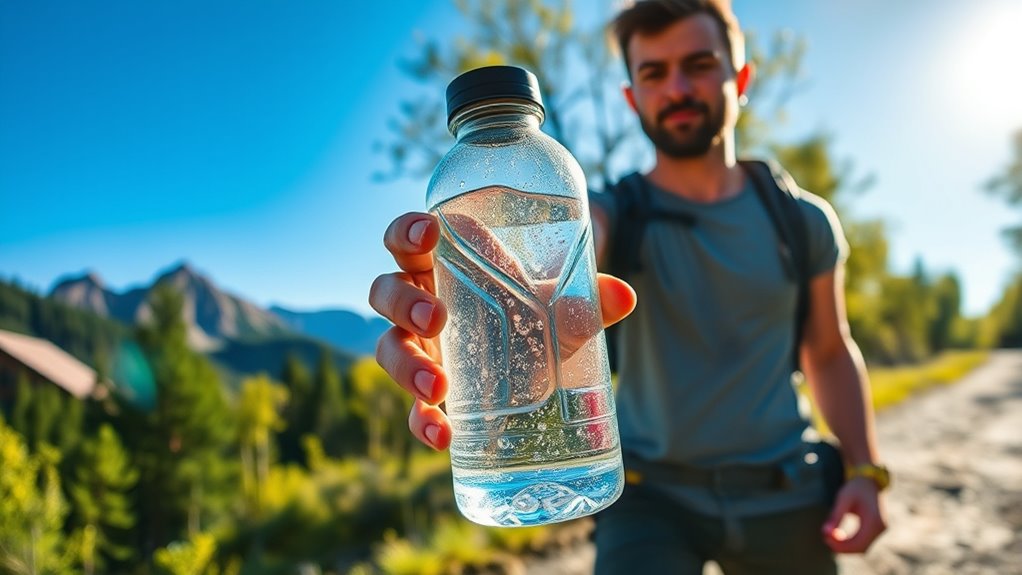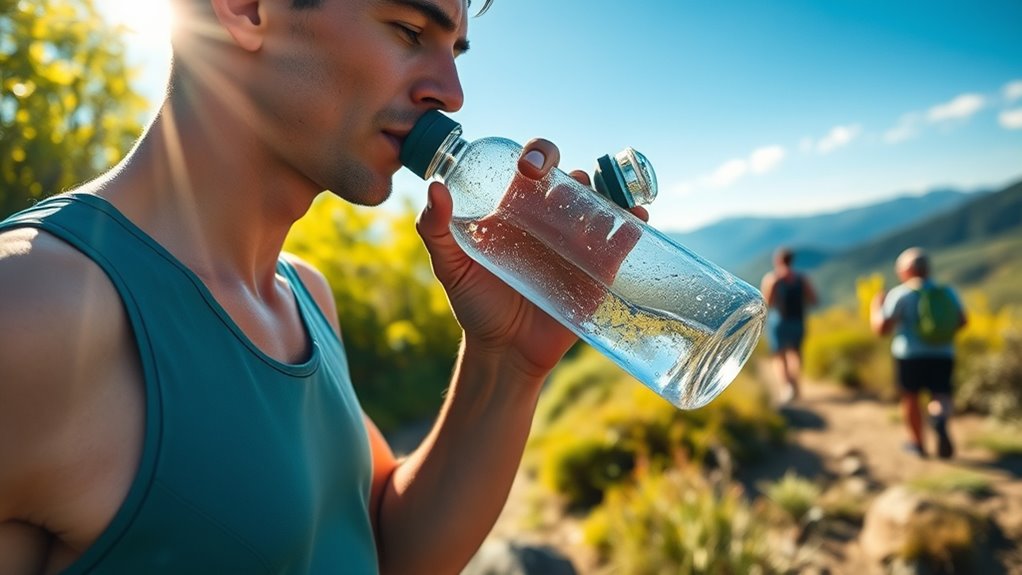Many common hydration myths can harm your outdoor performance. Believing that constant sipping water is necessary or that more hydration always improves performance can lead to overhydration, electrolyte imbalances, and health issues like hyponatremia. Listening to your body’s thirst signals and balancing electrolytes are key to staying properly hydrated. By understanding these misconceptions, you’ll be better equipped for safe, effective hydration. Keep exploring to discover how to optimize your hydration strategies and stay in top form.
Key Takeaways
- Constant sipping water during outdoor activities is unnecessary and can cause overhydration, disrupting electrolyte balance.
- Thirst is a reliable indicator of hydration needs; fixed drinking schedules may lead to overhydration or dehydration.
- Relying solely on water without replenishing electrolytes can cause imbalances, cramps, and fatigue.
- Believing more hydration always enhances performance overlooks the risks of hyponatremia and electrolyte dilution.
- Proper hydration depends on listening to body cues and balancing fluids with electrolytes, not just drinking large amounts of water.

Many common beliefs about hydration are actually myths that can lead to unnecessary or even harmful behaviors. For example, you might think that drinking water constantly is the best way to stay hydrated during outdoor activities, but overdoing it can cause more harm than good. When you hydrate excessively without considering your body’s needs, you risk diluting your electrolyte balance, which is essential for muscle function and nerve signaling. Electrolytes like sodium, potassium, and magnesium help regulate fluid levels and maintain your body’s internal balance. If these electrolytes become too diluted from drinking too much water, you could develop hyponatremia, a dangerous condition that can cause confusion, nausea, and even seizures. Recognizing dehydration symptoms early is critical, but the idea that drinking water alone is enough often leads you to ignore other signs of imbalance, such as dizziness, cramping, or fatigue. electrolyte balance is fundamental for proper hydration and physical performance.
It’s a myth that you need to sip water constantly, regardless of how much you’re sweating or how long your outdoor activity lasts. In reality, your body has a natural way of signaling when it needs fluids, and listening to those signals is more effective than sticking to a rigid drinking schedule. If you notice dehydration symptoms like dry mouth, dark urine, or headaches, then it’s time to hydrate, but not necessarily by gulping down large amounts of water all at once. Instead, focus on replenishing lost electrolytes, especially if you’ve been sweating heavily or for extended periods. Sports drinks that contain electrolytes can help restore your body’s balance more effectively than water alone, but be cautious of those with added sugars. Hydration isn’t just about quenching thirst; it’s about maintaining the proper electrolyte balance so your muscles function correctly and your body can recover from physical exertion.
Many people believe that the more they hydrate, the better they perform outdoors, but that’s a myth that can backfire. Overhydration can lead to a constant need to urinate, disrupt your electrolyte levels, and cause discomfort. It’s essential to pay attention to your body’s cues—drink when you’re thirsty, and consider your activity level, weather conditions, and sweat rate. Proper hydration isn’t about drinking the maximum amount of water possible; it’s about balancing fluids and electrolytes to keep your body functioning effectively. By understanding these myths, you can prevent dehydration symptoms and avoid the pitfalls of overhydration, allowing you to perform at your best during outdoor adventures.
Frequently Asked Questions
Can Drinking Too Much Water Harm My Outdoor Performance?
Drinking too much water can harm your outdoor performance by disrupting your electrolyte balance, leading to hyponatremia. To avoid this, focus on proper hydration timing—drink consistently before, during, and after activity, but don’t overdo it. Balance is key; incorporate electrolyte drinks if you’re sweating heavily. This way, you maintain ideal hydration without risking health issues that could impair your endurance and focus outdoors.
Are Sports Drinks Always Better Than Plain Water?
You might think sports drinks are always better than plain water, but it depends on your needs. If you’re sweating heavily and losing electrolytes, sports drinks help restore electrolyte balance and keep you energized. However, if you prefer plain water for hydration and don’t need extra sugars or flavors, it’s perfectly fine. Consider your activity level and preferences—flavor preferences can influence how much you drink, impacting your outdoor performance.
How Do I Know if I’M Properly Hydrated During Exercise?
To know if you’re properly hydrated during exercise, pay attention to your electrolyte balance and hydration timing. Thirst isn’t always reliable, so check your urine color—pale indicates good hydration. Maintain steady fluid intake before, during, and after exercise, and listen to your body’s signals. If you feel lightheaded or fatigued, you might need more electrolytes or fluids. Proper hydration keeps your performance ideal and prevents dehydration risks.
Do Hydration Needs Vary With Different Outdoor Activities?
Your hydration needs definitely vary with different outdoor activities. Higher activity intensity makes you sweat more, so you need to drink more fluids. Environmental conditions, like heat and humidity, also increase hydration requirements because you lose more water through sweat. Pay attention to your body and drink accordingly, especially during intense workouts or in hot weather. Adjusting your hydration based on activity intensity and environmental conditions helps you stay safe and perform your best.
Is Hydration More Important Than Nutrition for Outdoor Endurance?
You might wonder if hydration outweighs nutrition for outdoor endurance. While staying hydrated is vital for maintaining electrolyte balance and ideal hydration timing, proper nutrition supports sustained energy and muscle function. Both are essential—hydration keeps you alert and prevents cramps, but nutrition fuels your activity. Prioritize a balance, drinking fluids with electrolytes and timing hydration appropriately, to maximize your endurance and overall outdoor performance.
Conclusion
Now that you know these hydration myths are just smoke and mirrors, you can confidently tackle outdoor activities without overthinking every sip. Remember, staying properly hydrated is more about listening to your body than chasing after outdated rules. Think of your hydration habits as a well-tuned engine—when you give it what it truly needs, you’ll perform at your best. So, trust your instincts, stay consistent, and enjoy the great outdoors with clarity and confidence.










